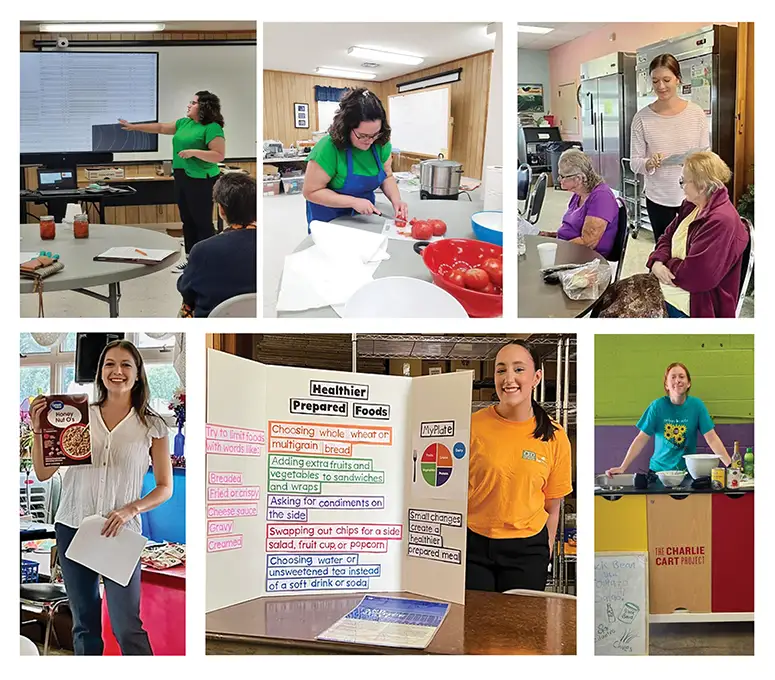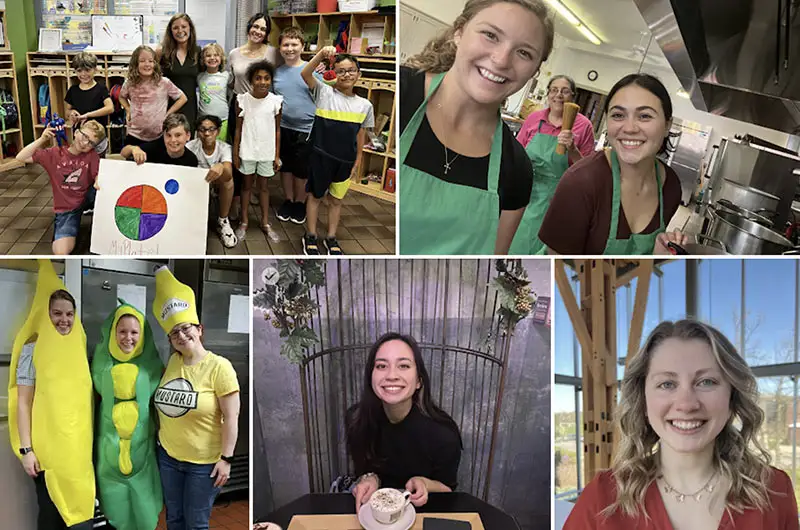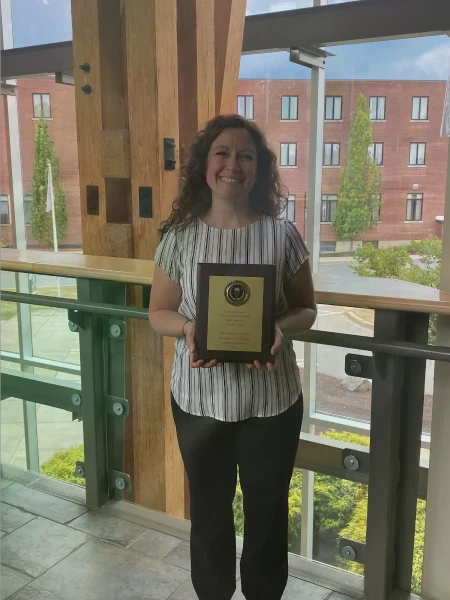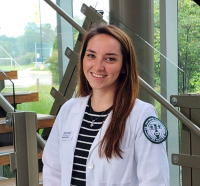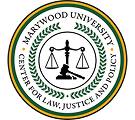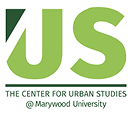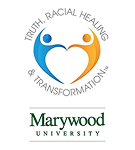Onsite Track
The dietetic program - onsite track is a full time program that will require students to come to Marywood University in Scranton, Pennsylvania.
The student will be placed in facilities/agencies in the Scranton/Wilkes-Barre or surrounding area and attend classes on campus. The program onsite track includes 36 graduate credits consisting of graduate coursework and supervised practice rotations or experiential coursework. Upon successful completion of the program onsite track, the onsite intern is eligible to take the RDN exam.
Facilities used for the onsite track placements will be in a 120-mile radius. Distances greater than 100 miles per day may be required for all rotations as well as the special pediatric rotation (CHOP).
Note: Students who have completed a minimum of a Bachelor's degree and a Didactic Program approved or accredited by the Accreditation Council for Education in Nutrition and Dietetics (ACEND) are eligible to apply. Acceptance is contingent upon acceptance from Graduate Admissions at Marywood University. Admission to the program is competitive. Up to 15 students are selected for the onsite track. Up to 10 of those 15 can potentially be accepted using the ACEND approved pre-select option available to current Marywood students only. Reach out to the Program Director for the specific application due date and additional details regarding the pre-select option for current Marywood Students.
Distance Track
The dietetic program - distance track is a full time program that allows the student to live anywhere, however, they are required to utilize facilities/agencies that are more than 125 miles from Marywood University.
This is an online graduate Master's program. Upon successful completion of all program components of the Distance track, the student has a Masters degree in Nutrition and is eligible to take the RDN exam.
For Marywood University's program it is not required to have preceptors identified as part of the DICAS application process. The distance track is a full-time program. Phase One is completed in the first year with online graduate coursework. Phase two begins in the summer session of that year with continued online graduate coursework combined with supervised practice. The distance track student will be responsible for locating sites for their supervised practice rotations. This is not required in the DICAS application. The Program Director does offer guidance throughout the first year to assist students but it is ultimately the responsibility of the intern to locate their sites for the distance track. This allows students to remain in their preferred location anywhere throughout the United States. The distance track students are only required to come on campus for the orientation held in the summer between Phase One and Phase Two prior to starting their supervised practice rotations. Onsite orientation is typically held in the last full week of June between the first and second year.
The graduate credits will count as part of the curriculum for the Master of Science (MS). Upon completion of the Master's Program - distance track, the student is eligible to take the RDN exam.
Note: Students who have completed a minimum of a Bachelor's degree and a Didactic Program approved or accredited by the Accreditation Council for Education in Nutrition and Dietetics (ACEND) are eligible to apply. Acceptance is contingent upon acceptance from Graduate Admissions at Marywood University. Admission to the program is competitive. Up to thirty students are selected for the distance track. Up to fifteen of those thirty can potentially be accepted using the ACEND approved pre-select option available to current Marywood students only. Reach out to the Program Director for the specific application due date and additional details regarding the pre-select option for current Marywood Students.
Distance Education Components
The dietetic experiential learning distance track is a full time program that allows the student to live anywhere, however, they are required to utilize facilities/agencies that are more than 125 miles from Marywood University's campus.
This is an online graduate Master's program which incorporates the supervised experiential learning rotations. Upon successful completion of all program components of the distance track, the student has a Masters degree plus a verification statement and is eligible to take the RDN exam.
For Marywood University's program it is not required to have preceptors identified as part of the DICAS application process. The distance track is a full-time program. Phase One is completed in the first year with online graduate coursework. Phase two begins in the summer session of that year with continued online graduate coursework combined with supervised practice. The distance track student will be responsible for locating sites for their supervised practice rotations. This is not required in the DICAS application. The Program Director can offer guidance throughout the first year to assist students but it is ultimately the responsibility of the student to locate their sites for the distance track. This allows interns to remain in their preferred location anywhere throughout the United States. The distance track students are only required to come on campus for the orientation held in the summer between Phase One and Phase Two prior to starting their supervised experiential learning rotations. Onsite orientation is typically held in the last full week of June between the first and second year.
The graduate credits will count as part of the curriculum for the Master of Science (MS). Upon completion of the MS + DEL Program - distance track, the intern is eligible to take the RDN exam.
Students are able to complete all coursework in their graduate courses asynchronously in the distance program in order to accommodate varying locations, schedules, and time zones. If a course holds a synchronous meeting, distance students are able to join via video conference call. If the student cannot attend a synchronous meeting, students are able to review the recorded meeting time. At the discretion of the instructor, students may need to complete an assignment if they are unable to attend a synchronous course meeting. Instructors will communicate this to students in the respective course syllabus and the learning management system.
Students should have access to the internet and a computer. A camera with a microphone is encouraged but not required.
Supervised Experiential Learning Site Guidelines
Students in the onsite version of the program are placed at sites within 120 miles of Marywood’s campus for all rotations.
Students completing the distance version of the program are required to identify their own supervised experiential learning sites. Sites and preceptors must be approved by the Program Director.
The site/preceptor must meet the following criteria:
The preceptor must be willing and able to teach, guide, and provide mentorship to a student and be committed to overseeing the required Supervised Experiential Learning (SEL).
The preceptor must maintain appropriate and current credentials for the profession (i.e., RDN, MD, PharmD, DO, LCSW, etc)
The preceptor must provide experiences that meet the required competencies in SEL.
The site must have adequate staffing to provide learning experiences to students, including proper supervision and instruction by the preceptor(s).
The preceptors must provide supervision for a significant and approved time along with instruction for projects to be complete.
A fully-executed affiliation agreement and preceptor agreement with the site and preceptor must be completed
A preceptor resume or professional development portfolio is submitted to provide proof that the preceptor is an acceptable and appropriate preceptor.
Completion of Preceptor and Competency-Based Education (CBE) Training provided by ACEND
Review of Program Resources including the preceptor handbook
Ability and preparedness to review Program Policies and Procedures with the Program Director by video conference call or by phone to clarify requirements and expectations.
It is the student’s responsibility to locate SEL sites and preceptors in the geographic location in which they desire to complete SEL.
Program Faculty are available for guidance throughout this process, and can aid students in identifying appropriate sites and preceptors. If the immediate area is saturated with other nutrition and dietetics students, students may need to research other nearby sites in locations that are less likely to receive SEL requests. Students may need to consider dividing SEL hours between multiple sites or offer to complete SEL in hours outside of the typical work week.
Admitted students will also have access to a list of sites that were previously used for SEL and their address and contact information. The list of sites is maintained by program faculty
Prior to applying to the program, students do not need to have SEL sites confirmed. It is recommended that at least six months before the SEL begins and students have the entire 1st year of Phase I of the program to obtain sites. Students are encouraged to start networking early on in the program to make connections that may lead to SEL sites and preceptors.
If a student has challenges securing sites or in the event the site and preceptor can no longer accommodate a student, program faculty can provide alternatives to support the student in completing the required SEL. The following alternatives may be recommended:
Alternate learning experiences that allow for assessment of attainment of the specified competencies can occur with case studies, simulation, role-play, or other activities. This option would adhere to current ACEND guidance regarding alternate SEL experiences, and would not exceed the amount permitted by ACEND.
Approval of off-schedule SEL hours to accommodate unexpected changes to scheduling which include completing hours during the evening or on weekends
Completing hours at telehealth sites or other SEL sites that offer remote options to attain the required competencies
Students may need to consider dividing clinical hours between a few different facilities or offer to complete SEL hours on the weekends or evenings to complete SEL requirements.
If a student encounters a situation where a preceptor or site is unable to accommodate the student, the student must immediately contact the Program Director and, if applicable, the Faculty of their current course. The Program Director, faculty, and student will determine the appropriate course of action for the student which could include any of the above recommendations as well as developing a plan with program faculty to complete the program requirements and make adjustments to their schedule. The student will be notified that they have up to 33 months to complete the program and this will allow for extenuating circumstances to be accommodated.
Program Goal 1:
The Marywood University Dietetic Graduate Program-Experiential Track will develop competent graduates to encourage critical thinking and evidence-based practice to promote wellness and to treat individuals and diverse populations.
Program Objectives for Goal 1 are measured by the following standards:
Upon completion of the program:
At least 80% of program students complete all program/degree requirements within 33 months (150% of the program length). (RE 2.1.c.1.a)
At least 90% of the program graduates will have completed at least one health promotion project throughout the program timeline.
One-year post completion:
On the one‐year post completion employer survey, of those that respond 90% will score “agree or strongly agree” with a mean value of 2.0 or greater regarding graduate’s preparation for entry-level practice. (RE 2.1.c.1.d)
Of graduates who seek employment 70% are employed in nutrition and dietetics or related fields within 12 months of the program graduation. (RE 2.1.c.1.b)
Over a three-year period:
The program’s one-year pass rate (graduates who pass the registration exam within one year of first attempt) on the CDR credentialing exam for dietitian nutritionists is at least 80%. (RE 2.1.c.1.2)
Program Goal 2:
The program will produce graduates who are confident self-directed leaders capable of effective advocacy and demonstrate commitment to the community and the profession.
Program Objectives for Goal 2 are measured by the following standards:
Upon completion of the program:
At least 85% of program graduates will take the CDR credentialing exam for dietitian nutritionists within 12 months of program completion. (RE 2.1.c.1.c.1)
On the end of program survey, at least 75% of graduates who respond will “agree or strongly agree” with a mean value of 2.0 or greater regarding the program fostering self-directed learning.
On the three-year post program survey, at least 80% of graduates who respond will “agree or strongly agree” with a mean value of 2.0 or greater regarding leadership service in the dietetics profession and/or the community at large.
On the three-year post program survey, at least 40% of program graduates who respond will indicate they have become a preceptor or mentor dietetic students.
Facilities & Technology
O'Neill Center for Healthy Families
The O'Neill Center for Healthy Families, located on University Avenue, provides classroom and research space, joining academic programs to innovative research. Students from the Nursing, Nutrition and Dietetics, Exercise Science, Respiratory Therapy, and Physician Assistant programs have classes in this building. It is also home to The Human Performance Lab, a state-of-the-art facility designed to serve the needs of student, professional, amateur, and recreational athletes and the community.
The Keith J. O'Neill Center for Healthy Families, dedicated on October 18, 2002, was named in honor of its benefactor, esteemed alumnus and former trustee Keith J. O'Neill '76, the first male to graduate from Marywood's dietetics program and an accomplished leader in the dietetics profession. He credits Marywood for "(giving) me the skills and confidence to take on the challenges that come from running a large food service department and eventually from the challenges created by starting my own company."
In 2024, Marywood University further expanded its deep commitment to health sciences during the dedication of the Pascucci Family Health Sciences Pavilion, a transformative addition to the Keith J. O'Neill Center for Healthy Families and a cornerstone of the EMPOWER Campaign.
The $11.5 million Pascucci Family Health Sciences Pavilion is a realization of Marywood's commitment to providing state-of-the-art facilities for education in the health sciences. Generously supported by the Pascucci Family and other dedicated donors, this new space elevates the learning experience of future healthcare professionals and contributes to the University's mission of fostering excellence in education.
Food Science Lab
In addition to traditional food testing tools, our Food Science Lab contains equipment to prepare students for food preparation in real-world commercial settings:
- Blast chiller and rethermalization unit
- Metabolic kitchen
- Sensory evaluation lab
- Ingredient room
Estimated Costs
|
Total 39 Credits |
Cost per credit $824 |
|
Course fees |
$500 |
|
Books |
$700-1000 |
|
Typhon Subscription |
$100 |
|
Transportation (Gas, Maintenance, Tolls, Parking, Incurred fees/fines/tickets) |
$300-2000 |
|
Clothing for Professional Components (lab coat, non-slip shoes, etc.) |
$100-300 |
|
Transportation to sites greater than 50 miles |
$100-900 |
|
Hotel/Rental Accommodations for potential sites* |
$200-1500 |
|
Medical Clearances, Immunizations, Lab work, Drug Screen, Titers, etc. |
$350-500 |
|
FBI Finger Print Clearance/Criminal Record Check – fees vary by state |
$100-300 |
|
Child Abuse History Clearance /Record Check – fees vary by state |
$25-100 |
|
Malpractice insurance – fees vary by state |
$40-100 |
|
Medical Insurance |
varies |
|
Onsite housing and meal plan for orientation prior to Phase II |
$400-600 |
|
Travel to mandatory orientation prior to Phase II |
$100-15000** |
|
School Fees/Activity Fees |
$500 |
* Students may be required to report to an MNT focus rotation that could incur additional costs
** Varies based on geographic location in relation to Marywood University
All costs are the student’s responsibility. All costs listed are an estimate and subject to change based on location and other factors.
Tuition and fee information can be found here: https://www.marywood.edu/affordability/tuition/
Financial Aid
Marywood has a financial aid office and information on the university website that can assist students in navigating college expenses and reviewing potential options for deferring student loans while continuing with graduate education through the Graduate Program.
Typically, the program qualifies for graduate student financial aid which is typically in the form of loans. However, Marywood University offers scholarships and graduate assistantships that may help offset the cost for students who qualify.
Students may also seek out additional scholarship information on the Academy of Nutrition and Dietetics Website or through other organizations such as academic sororities or fraternities, non-profit organizations, membership organizations, etc.
The Program Director forwards all opportunities for scholarship to students when available.
All students who are completing the onsite or distance versions of the program should have access to a personal technological device such as a laptop, cell phone, or tablet and a working microphone and camera. Students should have access to the internet. Students may require access to Zoom, Google Meet, or other video meeting platforms. Students will need access to their email, MarywoodYou Portal, Brightspace, Typhon, EhrGo, Adobe, and either Google or Microsoft Office suite to have access to spreadsheets, word processing, forms, and slides/powerpoint. Canva access is recommended but not required.
Faculty
Lindsay Howard
Department Chair | Assistant Professor of Practice
David T Frable
Assistant Professor
Kathryn Louise Tullio
Assistant Professor of Practice
Jessica R Bodzio
Associate Professor of Practice
Maureen Tara Burke
Assistant Professor of Practice
Kristine A Danilovitz
Lecturer
Maria K Deleo
Lecturer
Kaitlyn M Eck
Lecturer
Eduardo Rene Escobar
Lecturer | Lab Assistant (PT)
Ciarra Falzone
Administrative Assistant | Administrative Assistant
Gabrielle Celeste Giordano
Lecturer
Kevin Jay Goff
Lecturer
Erikah M Groninger
Lecturer
Julie M Leonard
Lecturer
Dr. Alan M Levine
Professor Emeritus | Lecturer | Lecturer
Dr. Erin Ann O'Hora
Lecturer | Lecturer
Karina L Rosser
Lecturer
Catherine E Sarkozy
Lecturer
Nicole Schofield
Lecturer
Stefanie M Smith
Lecturer
Saige Marie Sterner
Lecturer
Scott Robert Summers
Lecturer
Emily J Wargo
Instructor of Practice
Maria Wolfel
Lecturer
Courses & Curriculum (43 Total Credits)
Research Courses
ND 590 Research Methodology 3
ND 596 Capstone Experience 3 or ND 595 Research Thesis A, B & C 1 each
Foundation & Elective Courses
ND 520 Recent Trends in Nutrition 3
ND 530 Health Promotion 3
ND 535 Organizational Leadership in Healthcare 3
ND 537 Entrepreneurship 3
ND 561 Medical Nutrition Therapy I 3
ND 562 Medical Nutrition Therapy II 3
ND 579 Social Justice Advocacy for Health Professionals 3
ND 581 Advanced Topics Macronutrients 3
ND 582 Advanced Topics Micronutrients 3
SHPN 549 Sports Nutrition I Theory 3
SHPN 550 Sports Nutrition II Application 3
SHPN 575 Body Composition for Sports and Performance 3
Experiential Learning Courses
ND 553 Preparation for Supervised Experiential Learning 1.5
ND 565 Supervised Experiential Learning in Community Nutrition 1
ND 500 Supervised Experiential Learning in Professional Practice 1.5
ND 566 Supervised Experiential Learning in Food Systems Management 1
ND 568 Supervised Experiential Learning in Medical Nutrition Therapy (Long-term Care and Acute Care) 1
